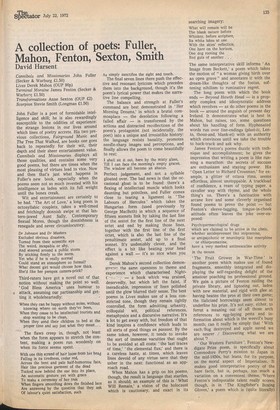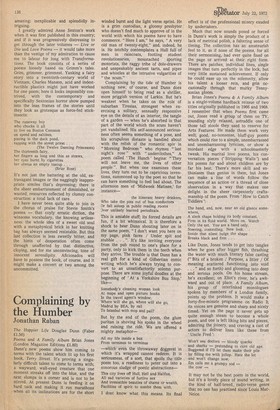A collection of poets: Fuller,, Mahon, Fenton, Sexton, Smith
David Harsent
Cannibals and Missionaries John Fuller (Secker & Warburg £1.50) Lives Derek Mahon (OUP 90p) Terminal Moraine James Fenton (Secker & Warburg £1.50) Transformations Anne Sexton (OUP £2) Scorpion Stevie Smith (Longman £1.50) John Fuller is a poet of formidable intelligence and skill; he is also rewardingly susceptible to the oddities of experience: the strange lesions in our lives around which lines of poetry accrete. His two previous collections, Fairground Music and The Tree That Walked, are books one goes back to repeatedly for their wit, their depth and their sheer entertainment value. Cannibals and Missionaries displays all those qualities, and contains some very good poems, but there are times when the most pleasing of virtues lead to vice. Now and then that's just what happens in Fuller's new book, especially when the poems seem not so much invested with his intelligence as laden with its full weight until the bones creak.
Wit and entertainment are certainly to be had. 'The Art of Love,' a long poem in octosyllabic couplets, takes a well-timed and fetchingly donnish swipe at that lantern-jawed Aunt Sally, Contemporary Sexual Mores, though the donnishness is renegade and never circumlocutory:
Dr Johnson and Dr Masters
Excluded obvious disasters, Turned from their scientific eye The weird, incapable or shy,
And steered around a public storm
By sticking firmly to the norm.
Yet who if he is really normal
Could stand an atmosphere so formal?
What decent girl would choose how thick
She'd like her perspex camera-prick?
Third-raters have got a novel out of that notion without making the point so well.
God Bless America' uses humour to attack, assuming our partisanship and getting it wholeheartedly:
When they can be happy without noise, without knowing where on earth they've been, When they cease to be intellectual tourists and
stop wanting to be clean,
When they send their children to bed at the proper time and say just what they mean The flaws creep in, though, not least when the form appears to stretch the content, making a poem run woodenly on when its force seems spent.
With one thin strand of hair loose from her head Falling in its tiredness, cedar red, Across the bent and pale half-humorous face, Hair like precious garment of the dead Tucked now behind the ear into its place, An automatic gesture yet with grace
To make a ceremony of her task
When fingers smoothing dows the finished lace Are answered by the question that they ask Of labour's quiet satisfaction, such As simply sanctifies the sight and touch.
The final seven lines there push the effective and resonant lyricism which precedes them into the background, though it's the poem's lyrical power that makes the narrative line compelling.
The balance and strength at Fuller's command are best demonstrated in Her Morning Dreams,' in which a brutal commonplace — the desolation following a failed affair — is transformed by the actions and distracted recollections of the poem's protagonist (not incidentally, the poet) into a unique and irresistible history: the language resists banality, promotes needle-sharp images and perceptions, and finally allows the poem to come beautifully to rest: I shall sit it out, here by the misty glass, Till I can face the morning's empty graces, The window sill become an abacus.
Perfect judgement, and not a syllable gloated over. The bad news is that the oc
casional gloat is to be found: there's a
flexing of intellectual muscle which looks daunting but pointless, and Fuller comes close to tearing a ligament in The Labours of Hercules' which takes the Hungarian form (used previously by George MacBeth) in which a sequence of fifteen sonnets link by taking the last line of the sestet for the first line of the next octet and end by making those lines, together with the first line of the first octet, which is also the last line of the penultimate sestet, add up to a final sonnet. It's undeniably clever, and the effect is a bit like beating your head against a wall — it's so nice when you stop.
Derek Mahon's second collection demonstrAtef. the same openness to theme and experience which characterised Night ( — a book which was praised, deservedly, but which left the faint, if ineradicable, impression of lines polished until the glow blurred their sense. The best poems in Lives makes use of a less constricted tone, though they remain tightly controlled, the form admitting urbanity, colloquial wit, political references, metaphysics and a discursive narrative. It's a lot to get away with, but freedom of that kind inspires a confidence which leads to all sorts of good things en passant. By the same token, however, it tends to invoke the sort of immense vacuities that ought to be avoided at all costs: 'the last traces of time," the elemental flux;' and there is a careless haste, at times, which leaves lines devoid of any virtue save that they usher in the next: functional as an approach road.
When Mahon has a grip on his poems, though, the result is language that startles, as it should; an example of this is 'What Will Remain,' a vision of the holocaust which is cautionary, and exact in its The same interpretative skill informs 'An Image from Beckett,' a poem which takes the motion of "a woman giving birth over an open grave" and annotates it with the dream-like thoughts of the foetus, softening nihilism to ruminative regret.
The long poem with which the book ends — Beyond Howth Head — is a properly complex and idiosyncratic address which revolves — as do other poems in the book — around the anguish of present day Ireland. It demonstrates what is best in Mahon, but raises, too, some questions about his handling of form. Hyphenated words run over line-endings (plast-ic, Lenin, thous-and, blank-et) with an authority which convinces until we take the trouble to back-track and ask why.
James Fenton's poems dazzle with technique and accomplishment; he gives the impression that writing a poem is like running a marathon: the secrets of success are enthusiasm and staying power. His Open Letter to Richard Crossman,' for example, a glitter of ottava rima, seems effortless, almost unstoppable. A truckload of confidence, a ream of typing paper, a cavalier way with rhyme, and the whole thing's on. There's a fascination with arcane lore and some cleverly organised found poems to prove the point — but Fenton's sleeve-tugging, tongue-in-cheek attitude often leaves the joke over-exposed:
Psychoparmacological drugs
which are claimed to be active in the clinic, whether antidepressant like imipramine, or antipsychotic or neuroleptic like reserphine or chlorpromazine, have a very marked antimescaline activity
in the mouse.
'The Fruit Grower in War-Time' is another poem which makes use of found fragments, smoothly integrated and displaying the self-regarding delight of the amateur poaching on professional ground. We gain a picture of Fenton raiding the private library, and tiptoeing out, laden with new material, and rigid with glee at having beaten the pros at their own game; the italicised borrowings seem almost to underline his prize. It's not easy, either, to ferret a meaning out of all those arch references to egg-laying pests and information about which is the weevil's busy month; can it really be simply that 'With each/Bug destroyed and apple saved we are nearer / Discovering what we are about '?
'Our Western Furniture ', Fenton's Newdigate Prize poem, is specifically about Commodore Perry's mission to Japan in
the mid-1850s, but leans, for its purpose, on the moral aspect of Imperialism. It makes good interpretative poetry of the
bare facts, but is, perhaps, too much a variation on a convenient theme. Where Fenton's indisputable talent really scores, though, is in 'The Kingfisher's Boxing Gloves,' a poem which is (quite literally)
amazing: inexplicable and splendidly intriguing.
I greatly admired Anne Sexton's work when it was first published in this country; and if it was progressively distressing to get through the later volumes — Live or Die and Love Poems — it would take more than the vestige of my admiration to cause me to labour for long with Transformations. The book consists of a series of poems loosely based on Grimm's tales. Grim, grimmer, grimmest. Yanking a fairy story into a twentieth-century world of Vietnam, Charles Manson, acid and indestructible plastics might just have worked for one poem; here it looks impossibly contrived, with the contemporary and specifically Sextonian horror show pumped into the lean frames of the stories until they look as grotesque as force-fed stickinsects:
The runaway boy who chucks it all to live on Boston Common on speed and saltines, pissing in the duck pond, rapping with the street priest . .
(The Twelve Dancing Princesses) The thirteenth fairy, her fingers as long and thin as straws, her eyes burnt by cigarettes her uterus an empty teacup . . .
(Briar Rose) It's not just the battering at the old, extravagant images or the naggingly inappropriate similes that's depressing; there is the sheer embarrassment of diminished, or wasted, resources reflected by clumsy construction: a total lack of care.
I have never been quite able to join in the chorus of praise for Stevie Smith's poems — that coyly erratic diction, the winsome vocabulary, the knowing artlessness: the whole idea of a sweet old soul with a metaphysical brick in her knitting bag has always seemed resistable. But this last collection is less sweetly bitter, and the hints of desperation often come through unaffected by that distinctive, cloying, and for me unconvincing, tone of innocent serendipity. Aficionados will have to possess the book, of course, and it might make a convert or two among the uncommitted.











































 Previous page
Previous page